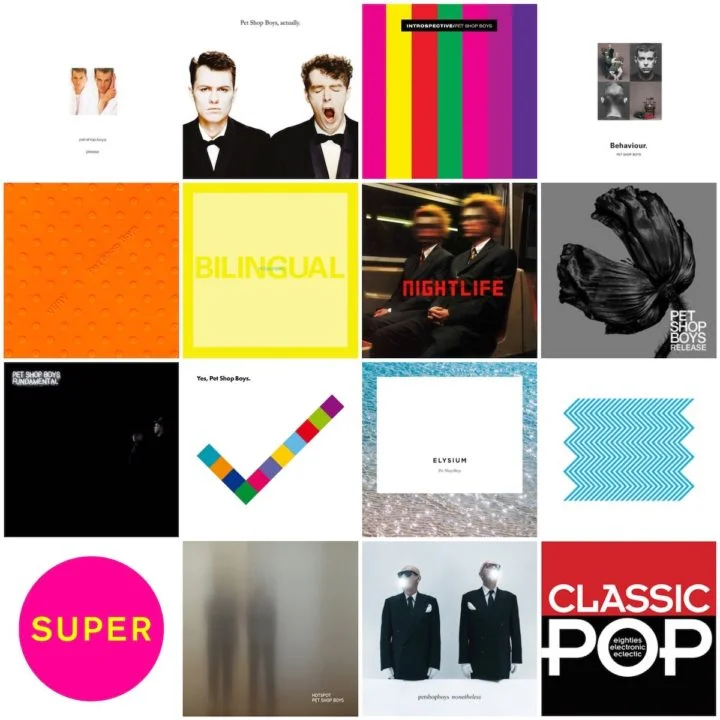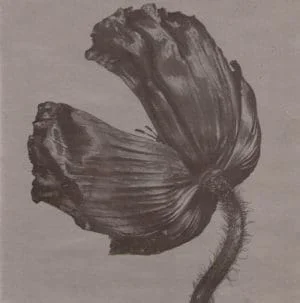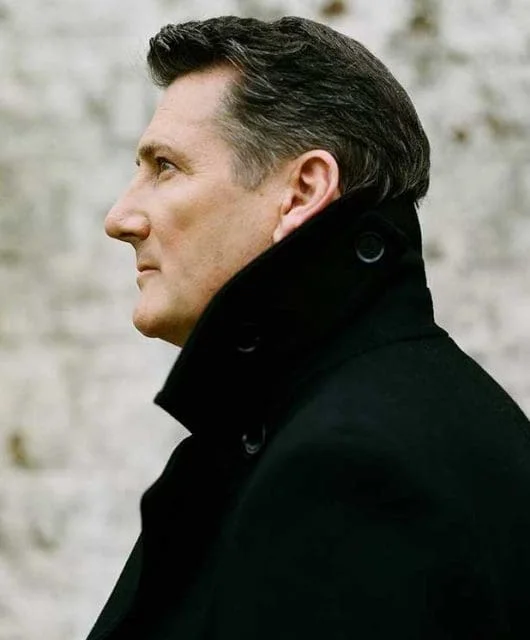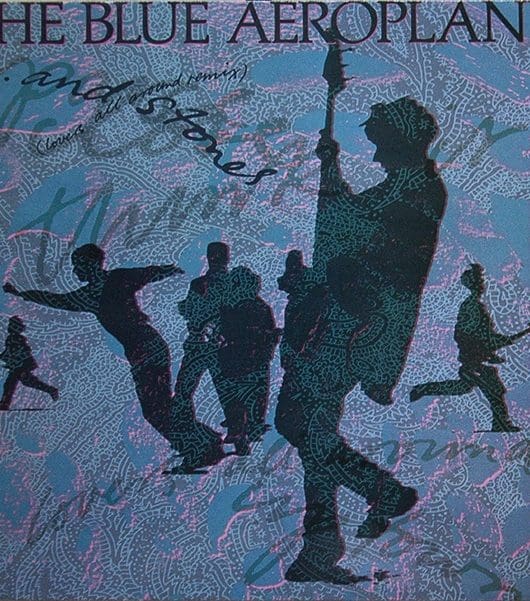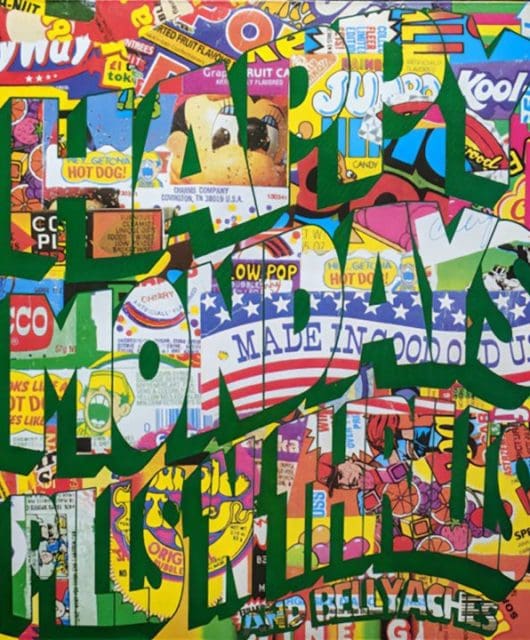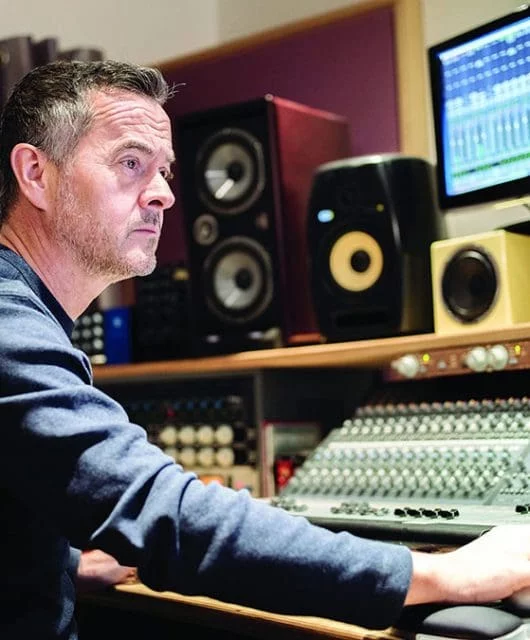Complete Guide – Pet Shop Boys albums
By Jon O'Brien | March 7, 2024
With Neil Tennant’s witty lyrics and Chris Lowe’s cultured synths and beats, the Pet Shop Boys’ albums helped to redefine the pop landscape…
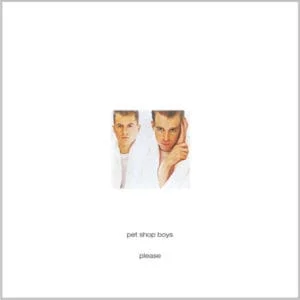
Please, 1986
Five years after first bonding over a shared love of Soft Cell and Orchestral Manoeuvres In The Dark at a King’s Road hi-fi store, Neil Tennant and Chris Lowe officially joined the pantheon of British electro-pop duos themselves. The pair’s 1986 debut studio album undeniably shared elements of their musical inspirations: the lustful pick-up anthem I Want A Lover (“No need for conversation as we’re driving home”) could have been lifted from Non-Stop Erotic Cabaret, while Stephen Hague was recruited in-between producing OMD’s Crush and The Pacific Age. However, Please also proved that Pet Shop Boys were capable of carving out their own distinctly arch path.
From Tennant’s deadpan delivery and Noel Coward-esque witticisms to Lowe’s banks of arpeggiated synths, all the hallmarks of PSB’s career are here, coalescing to perfection on West End Girls, a tale of inner-city life that remains one of the all-time great No.1 records, both in the UK and US. But like much of the album, its unusual melting pot of mournful trumpets, bustling traffic noise and hip-hop beats didn’t come easily.
Indeed, the pair had spent an entire year working with Hi-NRG maestro Bobby Orlando, only to abandon all their efforts after signing with larger-than-life impresario Tom Watkins and major label Parlophone. Luckily, five tracks were rescued by new partner-in-crime Hague, including their transatlantic chart-topper, the melodramatic Tonight Is Forever (later revived for their collaboration with Liza Minnelli) and TV soundtrack favourite Opportunities (Let’s Make Lots Of Money), a majestic anti-Thatcherite anthem regularly misconstrued as a celebration of yuppie culture.
Smash Hits
Suburbia, an ode to the disaffected youth inspired by the Brixton riots of the early 1980s, and the domestic androgyny of closer Why Don’t We Live Together?, further underlined PSB’s penchant for lyrical themes that require deep diving.
But the romantic comedy-friendly sentiment of Love Comes Quickly, apparently the first song that the pair ever wrote together, and Later Tonight’s unequivocal sense of longing showed they could tackle the straightforward love song, too.
Smash Hits, the pop bible for which Tennant had previously served as deputy editor, cheekily published a mock obituary in the issue that followed his departure from the mag (“In a matter of weeks, Neil’s pop duo Pet Shop Boys will be down the dumper and he’ll come crawling back on bended knees”).
Front-loaded with four consecutive Top 20 hits, Please immediately confirmed that Tennant would never need to grace their offices again.
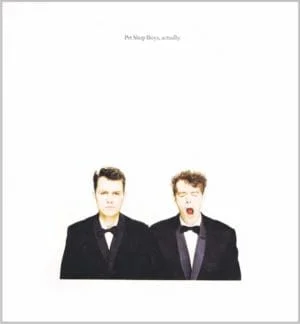
Actually, 1987
Playing up to their reputation as the pop scene’s masters of detachment, Actually’s album cover saw a typically stone-faced Lowe sitting side-by-side with Tennant failing miserably to stifle a yawn. Of course, there was nothing about the material itself to inspire such a display of boredom. This is a record, after all, which takes multiple pot shots at the Tory government (see Shopping, King’s Cross), single-handedly revived the career of a blue-eyed soul legend, and if Tennant is to be believed, even samples the voice of Luciano Pavarotti.
The Italian tenor’s vocals can apparently be heard (presumably buried way down in the mix) on Heart, the album’s second synth-pop masterclass to top the charts, and one written with Madonna in mind. The fact that the Material Girl would no doubt have snapped it up is a testament to how effortlessly PSB had made their way into the pop elite.
Read More: The best Pet Shop Boys cover art
Although sales would suggest otherwise (it only reached No.25 in the US), Actually feels like Pet Shop Boys’ true blockbuster record. It’s home to three-week No.1 It’s A Sin, the brilliantly bombastic admission of Catholic guilt whose suitably monastic video kickstarted the pair’s symbiotic partnership with auteur Derek Jarman. It also boasts one of their most memorable, and quietly cutting, lines (“I love you, you pay my rent”), with Rent one of several further tracks taken from their abandoned Orlando sessions given a spit and polish. And it also includes one of the all-time great pop duets, What Have I Done To Deserve This?, the bittersweet love story of a “major capitalist” and “pathetic feeble wreck” that brought the inimitable 60s diva Dusty Springfield back from the musical wilderness.
Such was PSBs’ dominance that they were given their own feature film, although a surreal seaside travelogue that starred Barbara Windsor didn’t exactly pull in Bohemian Rhapsody-style numbers. Luckily, It Couldn’t Happen Here’s title track is far less confounding, a heartfelt eulogy to an AIDS victim friend served perfectly by Angelo Badalamenti’s strings. The difficult second album syndrome that Lowe admitted to fretting over had been well and truly swerved.
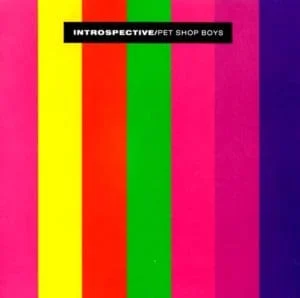
Introspective, 1988
Perhaps keen to prove they hadn’t abandoned the club scene that informed their earlier work, Pet Shop Boys’ third album was a curious collection of 12” mixes aimed squarely at the dancefloor, a creative move that Tennant later acknowledged alienated some of their casual fanbase. And yet the majority of its rather lean six offerings are now widely accepted as the definitive versions.
None more so than opener Left To My Own Devices. Allowing producer Trevor Horn to fully exhibit his art of noise, the sprawling eight-minute cut segues from string-soaked opera to throbbing electro-pop and back again, aligning with the lyric, “But in the back of my head I heard distant feet/ Che Guevara and Debussy to a disco beat.”
Elsewhere, their final US Top 20 hit Domino Dancing tapped into the burgeoning freestyle movement that largely bypassed Britain but conquered the States. Mashed up with the acid house of In My House, their Christmas No.1 Always On My Mind strays even further from the Elvis version, while the pair make Sterling Void’s positivity anthem It’s Alright their own with an extra politicised verse. A revisit of I’m Not Scared, the Europop hit they penned for Eighth Wonder, lacks the coquettish charms of the original. But otherwise, this is that rare remix album, which hangs together from start to finish.
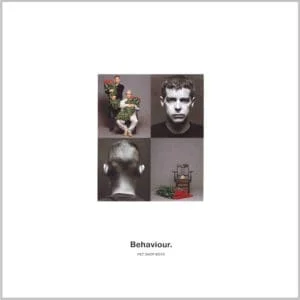
Behaviour, 1990
Lowe, in particular, has often been dismissive of Pet Shop Boys’ fourth LP, acknowledging that it sounded completely out of step with the acid house movement ushered in at the turn of the decade, and, thanks to its chart underperformance, joking that it should have been written off as a tax loss. Yet for many, Behaviour remains PSB’s magnum opus.
It’s true that the duo’s collaboration with analogue aficionado Harold ‘Axel F’ Faltermeyer is more suited to the title of introspective than its predecessor. The synths are warmer, the beats softer and the lyrics often achingly sadder, most notably on Being Boring, a beautifully wistful tribute to a childhood friend Tennant lost to AIDS, that became an unlikely favourite of both George Michael and Axl Rose. Despite the relatively lowly UK chart peak of No.20, it’s widely regarded as a career-best single, no mean feat from a band with 44 Top 40 hits to their name. The lovestruck balladry of Nervously and late-night post-disco feel of To Face The Truth also found the pop maximalists realising that sometimes less is more.
Symphonic Pop
While there’s little to get the ravers throwing shapes, Behaviour still has plenty of dancefloor moments: the Moroder-esque electro of infidelity tale So Hard, for example, or How Can You Expect To Be Taken Seriously?, a typically witty riposte to pop’s do-gooders, which took its cues from the burgeoning scene known as New Jack Swing. Meanwhile, My October Symphony, a melting pot of Soviet politics, Italo house piano and chamber strings which spearheaded the duo’s long-running affiliation with Tennant’s Electronic bandmate Johnny Marr, demonstrated that they still knew how to throw in everything but the kitchen sink.
Elsewhere, This Must Be The Place I Waited Years To Leave is another compelling admission of Catholic guilt, this time set to a gothic backdrop no doubt inspired by their love of Depeche Mode’s Violator. And although PSB failed to get first-choice Ennio Morricone to orchestrate, the Othello-quoting closer Jealousy is still a sumptuous slice of symphonic pop in which Neil Tennant channels his inner old-school crooner.
Behaviour wasn’t always the Pet Shop Boys we knew and loved, but it was arguably the duo at the peak of their powers.
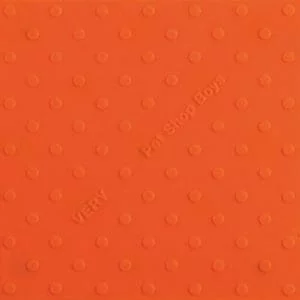
Very, 1993
After closing the first chapter of their career with 1991 retrospective Discography, Pet Shop Boys opened up their second with a pure pop statement of intent. It’s little wonder that on hearing Very for the first time, EMI bosses reportedly breathed a sigh of relief. Perhaps burned by the muted reaction towards Behaviour, Lowe and Tennant had imbued its follow-up with a vibrancy that was almost impossible to resist.
Indeed, having previously been denied the top spot by Michael Jackson’s Bad, U2’s Rattle And Hum and Paul Simon’s The Rhythm Of The Saints, the duo finally scored their first, and surprisingly only, UK No.1 album to date. They very nearly added to their tally of chart-topping singles, thanks to Go West, an affectionate Village People cover whose gloriously OTT synths and Cossack choir chants impressively managed to outcamp the original.
Read More: Pet Shop Boys interview – SMASH the system
There were plenty of other obvious hits where that came from, too. First taster Can You Forgive Her?, a caustic relationship tale concerning a closeted man boasting yet another classic PSB couplet (“She’s made you some kind of laughing stock/ Because you dance to disco and you don’t like rock”), immediately confirmed the pair were back to their bombastic best.
At the other end of the lyrical spectrum, I Wouldn’t Normally Do This Kind Of Thing established once again that Tennant could write about love without shooting multiple daggers. Meanwhile, A Different Point Of View and the brilliantly-titled Yesterday, When I Was Mad allowed Lowe the opportunity to fully embrace the rave scene that had previously passed them by, if in typically self-deprecating fashion (“And someone said, ‘It’s fabulous you’re still around today/ You’ve both made such a little go a very long way’”).
The swoonsome slow dance of Liberation, The Theatre’s orchestral breakbeat and gorgeously melancholic To Speak Is A Sin cleverly gave the record some breathing space away from the club. But as exemplified by its promos – a series of CGI-fests in which Lowe and Tennant sport various garish costumes and elaborate headwear – Very is very much a record largely designed to be turned up to 11.

Bilingual, 1996
Forget the Latin pop explosion of 1999. Three years earlier, Pet Shop Boys had transported the British public to warmer climes with a record steeped in the sounds of South America, a continent they’d travelled across during their previous world tour. It Always Comes As A Surprise, for example, is an understated slice of bossa nova that samples two of the genre’s masters, Stan Getz and Astrud Gilberto. The flamenco-tinged dance-pop of opener Discoteca segues effortlessly into the bilingual (well, if “Un momento, por favor” counts as bilingual) samba of Single. And accompanied by a monochrome, yet still resolutely summery video, the percussive Se A Vida É (That’s The Way Life Is) is essentially the 90s answer to the Lambada.
Featuring the production talents of Grammy-nominated DJ Danny Tenaglia and remix maestros K-Klass, Bilingual’s sunny disposition may well have stemmed from a sense of freedom: it was the first record made by the duo since Tennant officially came out to Attitude in 1994, something that he alludes to on the brassy diva-assisted house of Metamorphosis(“What I wanted to be was a family man/ But nature had some alternative plans”).
South American Vibes
Sadly, Neil’s announcement appeared to pigeonhole the duo on the other side of the pond. After signing to Atlantic Records in the States, Pet Shop Boys were assigned to the label’s Gay Marketing Division and never bothered the US Top 20 again.
And while there was no such marginalisation back home, the fact that A Red Letter Day suffered the biggest ever drop out of the Top 10 (9-42) suggested they were in danger of becoming a fanbase-only act here, too.
Bilingual may have fared better in the UK at least had it led with something other than Before, a perfectly adequate venture into smooth house featuring club legend Barbara Tucker, but not one that particularly screamed ‘first single.’ And fabulous though it is, the flamboyant disco-pop of closer Saturday Night Forever suggests the duo simply abandoned the album’s concept during its final stages. However, its previous 11 offerings result in one of PSB’s most cohesive, and underrated, studio efforts.
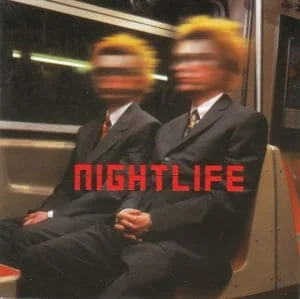
Nightlife, 1999
Just like the West End production it was designed to showcase (Closer To Heaven), Pet Shop Boys’ seventh LP drew a mixed response, some applauding its musical ambition and others arguing it was a sign of creative floundering: see the scathing Pitchfork review that dismissed it as a “mush of half-arsed trance, lyrics worthy of a late-middle-aged romance authoress and misguided R&B.”
The truth is probably somewhere in-between. At times, the pair appear to be replicating former glories, and not just their own. The brash disco throwback New York City Boy is a shameless rehash of Go West, while Boy Strange and opener For Your Own Good borrow from David Bowie’s Space Oddity and Faithless’ God Is A DJ respectively, the latter more forgivably due to the presence of producer Rollo.
However, I Don’t Know What You Want But I Can’t Give It Any More is a beautifully forlorn account of infidelity that echoes Everything But The Girl’s detour into downtempo electronica. Equally wordy single You Only Tell Me You Love Me When You’re Drunk fuses Tennant’s summations of a toxic romance with a plaintive melody that could have wandered over from Nashville. And the ‘father/daughter’ duet In Denial, their second collaboration with Kylie in her indie phase, further showed that Nightlife works better when it soundtracks the afterparty rather than the party.
Release, 2002
Nightlife was practically an unequivocal fan favourite compared to Pet Shop Boys’ eighth LP, by far the biggest outlier in their extensive back catalogue. As the seven appearances for Johnny Marr would suggest, Release saw the Pets largely abandon their signature synth-pop sound in favour of – perish the thought – guitars!
Thankfully, Tennant and Lowe hadn’t gone completely over to the dark side. Their second entirely self-produced effort is more at the campfire singalong end of the spectrum than the devil horns, axe-wielding side, with The Beatles appearing to be a particularly strong influence. The first but certainly not the last time they’d address New Labour, I Get Along is a Hey Jude-esque ditty that takes a satirical swipe at the tempestuous relationship between Peter Mandelson and Tony Blair. And Birthday Boy, inspired by a newspaper headline about then-football wunderkind Michael Owen of all people, lifts its six-string solo from John Lennon’s Happy Xmas (War Is Over).
While My Guitar Gently Weeps
But fans were still a little perturbed, which explains why Release became the first album that failed to spawn a UK Top 10 hit. Of course, the duo didn’t exactly ease everyone into this new stripped-back phase. Home And Dry’s baffling promo eschewed the elaborate visual feasts the Pets became renowned for and instead fixated on a bunch of London tube station mice for four long minutes. Already facing an uphill battle to get played, the primitive clip – directed by Turner Prize winner Wolfgang Tillmans, would you believe – essentially hammered a nail in the pair’s MTV career.
Release did keep a few toes in electronic territory, whether the wistful glitch pop of The Samurai In Autumn or the Visage-ish Here. And The Night I Fell In Love skewers Eminem while subverting his monster hit Stan, cleverly repositioning the crazed fan and his idol as lovers (“Next morning we woke/ He couldn’t have been a nicer bloke”). Far from a disaster then. But a good six years on from Cool Britannia’s peak and PSB’s sudden discovery of nostalgic guitar pop made them look far behind the curve.
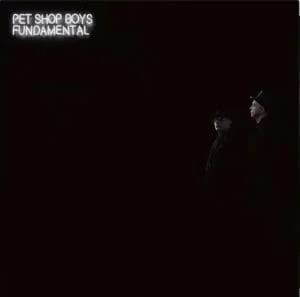
Fundamental, 2006
Just like Discography, Pet Shop Boys’ second hits collection PopArt appeared to renew the duo’s love of the dancefloor. There’s certainly nothing back-to-basics about Fundamental, a full-blown reunion with one of pop’s most celebrated maximalists, Trevor Horn, which also doubles up as a political manifesto.
While Tennant and Lowe had both been rubbing shoulders with the New Labour elite on that historic election night in 1997, their allegiances nine years on had soured. The pair take aim at everything from Blair’s special relationship with George W. Bush (I’m With Stupid) and the Iraq War (Twentieth Century) to the Government’s handling of immigration (Indefinite Leave To Remain) and the Identity Cards Act (Integral).
It’s something of a shock to hear Tennant, not exactly blessed with the most expressive of voices, sound positively indignant on the latter as he parrots opposing lines like “We’re concerned, you’re a threat/ You’re not integral to the project.”
But even the most right-leaning PSB fan could appreciate Casanova In Hell, a sardonic reimagining of the titular lothario as an impotent laughing stock, and Minimal, a mix of Speak & Spell robotics, surging synths and Peter Hook-inspired basslines that could be their finest single this side of the millennium. Conversely, Numb, a listless Broadway-style ballad hitmaker Diane Warren must have penned on an off-day, may be their worst.

Yes, 2009
Pet Shop Boys may have given The Loving Kind to Girls Aloud (and bizarrely relegated Philip Oakey collaboration This Used To Be The Future to bonus track status), but they still kept 11 of their recordings with innovative hit factory Xenomania for their last album to bother the singles chart.
Yes produced two UK Top 40 hits, and indeed two Billboard Dance chart-toppers, thanks to Love Etc., which intersperses buoyant terrace chants with withering put-downs against the uber-materialistic (“You need more than Gerhard Richter hangin’ on your wall”), and the contrastingly sweet Did You See Me Coming? In the year PSB were awarded the Outstanding Contribution to Music at the BRITs, with long-time fans Brandon Flowers and Lady Gaga in tow, their 10th studio LP was a welcome reminder that the duo weren’t ready to be put out to pasture just yet.
Back-To-Basics
While Xenomania were renowned for their cut-and-shut approach to pop, their girl group work often sounding like they’d plucked the best parts from about a half-dozen songs, Tennant and Lowe appear to have reined them in a little here. Only closer Legacy goes into unexpected places, segueing from sumptuous strings, horns and timpani arranged by Arcade Fire regular Owen Pallett to anxious Gallic waltz, while namechecking everything from Carphone Warehouse to the Firth of Forth. But that doesn’t mean Yes is guilty of sameness.
Also orchestrated by Pallett, Beautiful People sees the pair take a rare journey back to yesteryear, namely Phil Spector’s Wall of Sound, while taking aim at modern celebrity culture. King Of Rome harks back to when Massive Attack were the coffee table soundtrack of choice, albeit with one of Tennant’s dodgiest rhymes (“I couldn’t be more lonely…/ Someday you’ll deign to phone me”), while All Over The World continues Lowe’s habit of incorporating parts of classical favourites into unlikely places: that’s the Nutcracker Suite you can hear amid all the acidic squelches and electro-funk beats.
As New Order and Franz Ferdinand found out, the Xenomania way of working isn’t for everyone. But this back-to-basics affair, for the most part free of the politics that dominated its predecessor, lived up to its title’s positivity.
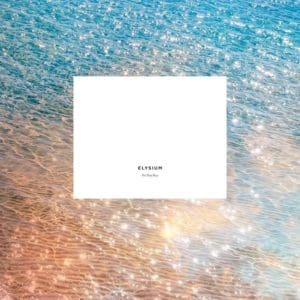
Elysium, 2012
Pet Shop Boys appeared to take another leftfield turn for their 11th studio album on appointing co-producer Andrew Dawson, a man whose CV includes three albums with Kanye West. But unless you count the deadpan spoken word on Ego Music, a hilarious skewering of pretentious celebs perhaps inspired by the ex-Mr. Kardashian (“I see myself as a building/ My mind is the office where the work gets done”), there’s little to connect the dots.
Indeed, the fact Elysium was originally titled ‘Happy Sad’ gives you some inkling about its prevailing bittersweet mood. Leaving and closer Requiem In Denim And Leopardskin both sound tailor-made for Ibizan sunsets, but the former sees Tennant reflect on the parallels between death and heartbreak, while the latter is a poignant send-off for the pair’s late make-up artist Lynne Easton. Even Olympics anthem Winner, released shortly before they took their rightful place at London 2012’s closing ceremony, seems more suited to consolation prize than gold medal. A surprise spiritual sequel to 1990’s Behaviour, then, even if it never quite reaches the same heights.

Electric, 2013
An album of many milestones, Electric was the first released through Pet Shop Boys’ x2 label, the start of a fruitful working relationship with Stuart Price and their highest-charting entry at home (No.3) and Stateside (No.26) since 1993’s Very.
It’s easy to see why those who jumped ship with Elysium’s introspection climbed back aboard. You only need look at the promo shot in which Lowe’s head is fully encased in a mirrorball to recognise that this time the pair meant disco business.
Having masterminded similar high-energy comebacks for fellow Classic Pop favourites Madonna, Kylie and Seal, Price was perfect for the job.
Lead single Axis, a commanding slice of electro-house where a vocodered Tennant chants “Electric energy,” is the most fired-up PSB have sounded outside remix circles. The Last To Die repurposes Bruce Springsteen’s anti-war protest into a celebratory paean to gay culture, while Love Is A Bourgeois Construct proved they could still embrace the highbrow while also throwing some shapes. “This is my kind of music,” Tennant sings on Vocal, a hands-in-the-air banger Calvin Harris could drop at a Vegas superclub without anyone batting an eyelid. It’s also ours, too.

Super, 2016
“Electric, but more of the same” was how Pet Shop Boys teased their 13th LP, no doubt much to their label’s discontent. You could argue that the pair were selling themselves short. Sure, Super is another assault on the dancefloor produced by Stuart Price and lead single The Pop Kids, a handbag house throwback advocating the joys of the night out, is essentially Vocal Part II. But with thumping Berghain-friendly trance (Inner Sanctum), honky tonk techno (Happiness) and dreamy breakbeat (Into Thin Air), it had plenty new to offer.
Despite the inclusion of the near-wordless Pazzo!, Super is much more of a storyteller, too. Twenty-something, a curious fusion of reggaeton and the English Riviera pop of Metronomy, is Opportunities (Let’s Make Lots Of Money) for the generation who’ve grown up on The Apprentice (“Thirty’s calling/ Round the bend/ Will your ideas/ Ever trend?”)
Sad Robot World is a ‘does what it says on the tin’ electro-ballad that manages to make you feel sorry for a bunch of overworked androids. While the mournful The Dictator Decidesimagines a self-hating, self-aware tyrant pleading for the sweet relief of execution against pulsing synths, mournful operatic wailing and marching beats. Super might be pushing it a bit, but arriving 30 years after their debut, this companion piece is undoubtedly smart, stylish and solid.
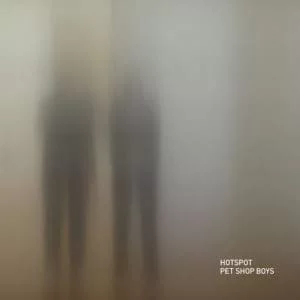
Hotspot, 2020
Pet Shop Boys’ third consecutive collaboration with Stuart Price, Hotspot was largely recorded at the same Hansa Studios that shaped another threesome, Bowie’s Berlin trilogy. And the pair seemed enamoured by their German sojourn. The pounding electro of opening number Will-O-The-Wisp not only sets its meet-cute aboard the U-Bahn, but samples noise from the famous party line, too. You Are The One may well be the only love song to namecheck the affluent neighbourhood of Zehlendorf. And then there are elements of Kraftwerk (the call and response nu-disco of Monkey Business) and early Romantic composer Mendelssohn (the truly bizarre Wedding March-goes-EDM of closer Wedding In Berlin).
However, the pair don’t entirely forget their roots. Foreshadowing both their Lost EP and Years & Years’ poignant It’s A Sin cover, Olly Alexander duet Dreamland is a thinly veiled attack against Brexit that suggests the duo are happy to pass on the queer synth-pop mantle to their most obvious successors.
Let’s Dance
Hoping For A Miracle adds to their canon of anti-Blair songs, reflecting here on the former PM’s reputation in the wake of the Iraq War (“When nobody loves you/ Nobody needs you/ You’re out here on your own”). And slightly contradicting Tennant’s tongue-in-cheek claim that “all acoustic guitars should be banned,” Burning The Heather ropes in longtime admirer Bernard Butler for the stripped-back tale of a lonely troubadour which could have neatly fitted onto Release.
Elsewhere, Only The Dark is a gleaming Behaviour-esque synth-pop affair about a night of passion, which is perhaps the closest PSB have come to a bedroom jam (“It’s time to make a fire/ Play some music low/ I’m right here next to you/ With nowhere else to go”). I Don’t Wanna brilliantly subverts the party anthem, with Neil expertly playing the sulky introverted teen who’d rather sit at home alone on a Friday night than go clubbing. While Happy People is the kind of euphoric vintage house that eventually persuades him to put his dancing shoes on.
On this evidence, a fourth studio effort with Price would be more than welcome.
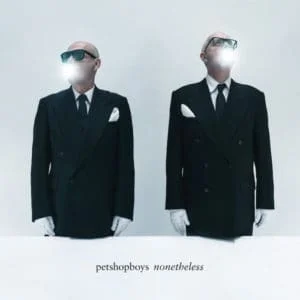
Nonetheless, 2024
Neil Tennant is in the form of his life as the synth-pop legends celebrate going back home with one of their most diverse albums to date
Returning to their original label of Parlophone 12 years after Elysium looked like being the final album on their natural home, Pet Shop Boys mark the occasion with their most stately work since that polarising record.
Neil Tennant promised CP last year that “The strings are back”, which is in truth a worrying sign for those fans who found Elysium and Release just a little too sombre. That their new producer James Ford’s work with The Last Shadow Puppets, of all bands, was the reason PSB approached him – rather than, say, having Kylie, Jessie Ware or Depeche Mode on his CV – equally appears a head-scratcher.
Yet, if Nonetheless isn’t quite in the same class as Behaviour (and frankly, what is?), it certainly shares the spirt of their 1990 masterpiece. Rather than the “We’re serious artists” mood of 2002’s Release, here the strings and brass are largely there to bring extra joy.
Neil Tennant has rarely celebrated love so openly in his lyrics than Feel or The Secret Of Happiness, ballads which head further into the stars thanks to their opulent arrangements. For anyone who has Between Two Islands as their favourite PSB B-side, its Balearic bliss is back on The Secret Of Happiness.
The Joys Of Pop
The extravagance peaks on A New Bohemia, one of Tennant/Lowe’s richest and most dramatic songs, yet maintaining a truth and beauty thanks to Neil’s plaintive vocals at its core. Indeed, one of Nonetheless’ many joys is how beautiful Tennant’s voice is. He may joke that crying on the dancefloor is his comfort zone in the I Wouldn’t Normally Do This Kind Of Thing mood of Why Am I Dancing?, yet Neil’s voice has never been so consistently emotional as it is across these 10 songs.
While Tennant’s gravitas dominates, Nonetheless isn’t especially earnest, as it’s still in thrall to the joys of pop: house banger Bullet For Narcissus is this album’s So Hard and the chunky Dancing Star could have bounced straight in from Side Two of Please. OK, that means we have to endure the weirdly garish The Schlager Hit Parade, which is basically what Pet Shop Boys haters think Pet Shop Boys always sound like, but one bit of eurotrash can’t disrupt an otherwise perfectly judged album.
Nonetheless is the most varied PSB LP since Fundamental, almost an instant Best Of for how many other Pets songs it brings to mind. It deserves to capitalise on any wayward fans returned to the fold since the endless post-Covid hits tour. And, given how good Neil Tennant’s vocals are here, it seems like Pet Shop Boys might just be getting started all over again. (John Earls)
For full details click here
Read More: Pet Shop Boys singles – The Top 40


